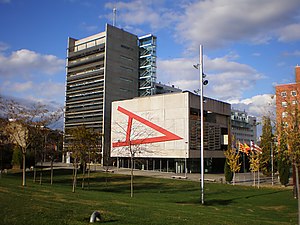Mollet del Vallès
Mollet del Vallès | |
|---|---|
 | |
| Coordinates: 41°32′20″N 2°12′47″E / 41.539°N 2.213°E | |
| Country | |
| Community | |
| Province | Barcelona |
| Comarca | Vallès Oriental |
| Government | |
| • Mayor | Josep Monràs Galindo (2015)[1] (PSC-PSOE) |
| Area | |
| • Total | 10.8 km2 (4.2 sq mi) |
| Elevation | 65 m (213 ft) |
| Population (2018)[3] | |
| • Total | 51,133 |
| • Density | 4,700/km2 (12,000/sq mi) |
| Demonym | Molletà |
| Area code | 08100 |
| Website | molletvalles |
Mollet del Vallès (Catalan pronunciation: [muˈʎɛd dəl βəˈʎɛs]) is a municipality in the comarca of the Vallès Oriental in Catalonia, Spain. It is situated in the valley of the Besòs river, and is an important communications hub from Barcelona towards the north: the AP-7 Motorway passes through the municipality, as do the RENFE railway lines to Vic and Puigcerdà and to Girona and Portbou. The town is also served by the C-17 highway (formerly N-152).
Mollet del Vallès has a number of buildings in the modernista and noucentista styles. The studio-museum of the painter Abelló displays modern Catalan art.
Shooting at the 1992 Summer Olympics was carried out in Mollet del Vallès; the range has been reused for the 1998 ISSF World Shooting Championships.
History
10th century
In the middle of the 10th century, Mollet was a little center of population that depended on the bishop of Barcelona.
12th century
Of the medieval past of Mollet, there is only remaining the Romanesque church of Santa Maria de Gallecs
From 15th to 18th centuries
Mollet (which back then also included Parets) didn't raise the population until the 17th century, then, a new church was built, but as ruling a town with 3 churches was hard, there were constant conflicts, which concluded with the separation of Parets.
Sites of interest

- St Fost's Church
- The Abelló Museum
The Abelló Museum is a municipal art museum located in Mollet del Vallès, in El Vallès Oriental.[1] Opened on 29 March 1999, its principal collection comprises pieces from artist and collector Joan Abelló, which donated his collection to the city in 1996, creating the Joan Abelló Foundation, an independent organisation of the Mollet del Vallès Town Council. The museum is located in an Art Nouveau-style building from 1908, of which only the façade has been preserved.[4]
- The old Market

Known characters
- Alexia Putellas, midfielder for FC Barcelona Femení and Spain women's national football team
- Joan Abelló i Prat, artist (1922-2008)
- Josep Maria Pou i Serra, actor and cinema director, teatre i televisió (1944)
- Josep Solà i Sánchez, musician (1930-2009)
- Jordi Solé i Tura, politician and founder of the Spanish Constitution of 1978 (1930-2009)
- Montserrat Tura, politician (1954)
- Mojinos Escozíos, music group founded in Mollet, where some of its members live.
- Anna Simon i Marí, journalist (1982)
Twin towns
 Rivoli, Italy
Rivoli, Italy Cinco Pinos, Nicaragua
Cinco Pinos, Nicaragua Ravensburg, Germany
Ravensburg, Germany
References
- ^ "Ajuntament de Mollet del Vallès". Generalitat of Catalonia. Retrieved 2015-11-13.
- ^ "El municipi en xifres: Mollet del Vallès". Statistical Institute of Catalonia. Retrieved 2015-11-23.
- ^ Municipal Register of Spain 2018. National Statistics Institute.
- ^ http://www.museuabello.cat/?lang=es
- Panareda Clopés, Josep Maria; Rios Calvet, Jaume; Rabella Vives, Josep Maria (1989). Guia de Catalunya, Barcelona:Caixa de Catalunya. ISBN 84-87135-01-3 (Spanish). ISBN 84-87135-02-1 (Catalan).
External links





